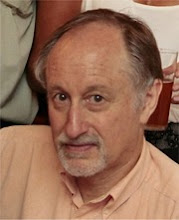Informal learning is perception mediated by social interaction and converting into behavior, which in turn converts back into perception.
How do children learn their language? Answer: by actively constructing it informally. Second anwser: by staying free of any formal learning until the age of 5 or 6! A child's language learning goes through stages but the process is cyclical. It always involves:
1. listening and discriminating those elements (sounds, phrases, sentences) that appear to be meaningful, whose meaning is indicated by both emotion (affect) and action (association producing both causal and descriptive links between things, events and language),
2. participating in language production experimentally (speaking) before mastering the rules, starting with repeated syllables and growing incrementally as proprioceptivity develops,
3. Interacting in varied situations of real and simulated need (play), judging the value of the reactions provoked and adapting.
 How the brain builds language competency (sentence forming capacity) only God and Noam Chomsky can tell us. But the easily observable fact is that the only way it can be achieved is informally. When children get to the phase of formal language learning (i.e. school, with a little bit of useless parental coaching before that: e.g. “not 'he goed' but 'he went'), it is style that is taught formally, not language. Why the educational systems of the world fail to recognize this is beyond me, although I can think of some good political motives for perpetuating this error. All of which may explain why it's so hard to learn style and so few achieve success with style. There are too many people teaching it and not enough learning it. This is also why no amount of formal teaching can result in the learning of a foreign language. At best teaching provides a map that gives enough spatial orientation for the learner to begin interacting with a real environment in a state of minimized confusion. And spending too much time on the map before confronting the real informally will distort perception of the real. But how many teachers think of their work as first of all provoking the growth of spatial orientation?
How the brain builds language competency (sentence forming capacity) only God and Noam Chomsky can tell us. But the easily observable fact is that the only way it can be achieved is informally. When children get to the phase of formal language learning (i.e. school, with a little bit of useless parental coaching before that: e.g. “not 'he goed' but 'he went'), it is style that is taught formally, not language. Why the educational systems of the world fail to recognize this is beyond me, although I can think of some good political motives for perpetuating this error. All of which may explain why it's so hard to learn style and so few achieve success with style. There are too many people teaching it and not enough learning it. This is also why no amount of formal teaching can result in the learning of a foreign language. At best teaching provides a map that gives enough spatial orientation for the learner to begin interacting with a real environment in a state of minimized confusion. And spending too much time on the map before confronting the real informally will distort perception of the real. But how many teachers think of their work as first of all provoking the growth of spatial orientation?
Informal learning can be thought of as the kind of mental map making we all end up doing on our own in any area where we feel minimally competent. Our map evolves significantly as we continue to explore our world and refine our skills through our interactions with people and things (think of Columbus's mental picture of the globe over the span of his four voyages). If we lack confidence in our own map and cling to the belief that the official map (e.g. curriculum) proposed in formal learning is the only valid thing, we end up learning... nothing! And although it's a notorious myth that Europeans believed the world was flat before Columbus proved otherwise – a falsehood that I was taught formally at school! - the formal learning of the time taught that there was nothing but a vast ocean between the west of Europe and the east of Asia. Thanks to Columbus's experience and evolving mental map we now know otherwise.

Franz Ackerman, Mental Map: Evasion V

No comments:
Post a Comment